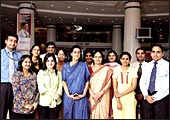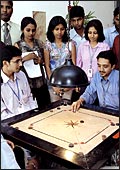 |
| Team HSBC: Kidwai (in blue sari) with
staff |
In
early august, HSBC India did something it had never done before.
The bank moved to a five-day week. August 5 was the first 'off-Saturday'
for its employees-a small event perhaps for the outside world,
but a giant leap for HSBC employees. Make that yet another giant
leap for HSBC employees. Indeed, over the past five years, the
Hong Kong-headquartered bank's Indian subsidiary has been quietly
but surely transforming itself from a perceptibly ponderous organisation
into one that's more contemporary and forward-looking. A laidback
style of managing has made way for an aggressive, growth-oriented
mindset, the best reflection of this in the market place being
HSBC's bid to acquire a stake in the UTI Bank in 2003. And yes,
in the process of becoming more proactive, HSBC's also become
a cool place to work in. As Tim Kirby, Head, Human Resources,
puts it: "We want people to work for us because they want
to work for us."
SNAPSHOT
NET INCOME: Rs
2,302 crore (2005-06)
PROFITS: Rs 515 crore |
Total employees: 4,985
Attrition (per cent): 22.3
Average career tenure: 5 years
Training budget (budgeted/actual): Rs
8.5 crore/ Rs 11.5 crore
Training man-hours (actual): 11,590 |
Allowing employees the luxury of a longer
weekend is just one way of making them want to work for HSBC.
There have been other similar initiatives in the recent past to
change the culture from a prim and proper way of work to a more
casual one. One such initiative is an open-door policy, endemic
at most organisations, but arguably blasphemous at HSBC till a
few years ago.
 |
| Play as I, think as we: Working in collaboration
as a team is the essence at HSBC. The bank has adopted a more
informal style to make it a cool place to work in |
"We are serious about the open-door approach.
It is important for people to know that they are working for a
growing organisation and that the organisation has laid down specific
career progressions for them," says Kirby. Given that there
are about 5,000 people who work for the bank alone, and 22,000
across the organisation-HSBC also has an asset management company,
a securities outfit, a software development centre in Pune and
outsourcing hubs in Bangalore, Hyderabad, Visakhapatnam and Kolkata-monitoring
individual needs isn't easy. But it's an imperative nevertheless.
Making that task even more challenging is
the fact that over half of the bank's employees have been around
for less than 18 months (perhaps a rather high attrition rate
of 22 per cent has something to do with that). Kirby himself has
been in his current assignment for about a year now, having done
stints with the bank in West Asia, Europe and Asia earlier. The
good news today, though, is that people are willing to join HSBC
from competitors who are perceived to be more aggressive and savvy.
Consider, for instance, Kalpana Ajayan, Vice President, Insurance
Products & Alternate Channels (Personal Financial Services),
who has been with HSBC for two years now. Her previous stint:
Four years with- ahem-Citibank. Reason for the shift? "The
promise of the scale of things to come and a vision that is getting
clearer," in Ajayan's own words. According to Kirby, HSBC
is looked at by students in a positive light. "They think
we are a sales-oriented organisation, a fair payer and more importantly
an equal opportunity employer," he explains.
But it's not as if most of HSBC's workforce
is made up of Johnnies-come-lately. In fact, roughly 19.4 per
cent of the personnel have been with the bank for a decade and
more. Like, for instance, Basab Majumdar, Senior Vice President
and Head (Western India), Corporate Banking, who has done a 12-year
stretch with HSBC. And if you think the veterans lack the passion,
listen to what Majumdar has to say. "Over the past two years,
corporate banking alone has added over 400 new corporate relationships.
This is at a time when competition is no pushover."
INTERVIEW/NAINA
LAL KIDWAI/HSBC'S GROUP GM AND COUNTRY HEAD, INDIA
"I am Here Because of the Customer" |
|
 HSBC's
India CEO of six months spoke to BT's Krishna
Gopalan on her people agenda. Excerpts: HSBC's
India CEO of six months spoke to BT's Krishna
Gopalan on her people agenda. Excerpts:
On HSBC's four Cs: Communication, customer centricity,
competitive benchmarking and collaboration.
The one thing that is key is customer centricity. The dimension
I wanted to bring is that apart from an external customer,
there is also an internal customer. So, every support group
within the bank also has a group. Football was used as an
analogy where we wanted to highlight that you should "play
as I" but "feel as we". What we are saying
is there is individual excellence, but you must feel as
a part of a team. The theme here is: "I am here because
of the customer" and we all need to work in collaboration
as a team. The third thing is about communication; we allow
anyone to ask the top management anything they would want
to know. I want people, for instance, to address me by my
first name and to bring in the element of informality. While
we are doing very well, it is about how we do vis-à-vis
market share and competition, which is what competitive
benchmarking is all about. This is about keeping our eyes
and ears open all the time.
On the culture and the work environment at HSBC.
The uniqueness is that everyone here identifies very strongly
with HSBC. It is important to combine that with a degree
of informality and respect for diversity which brings with
it freedom of thought, ideation and even action, but within
our norms. I want us to retain what is very solid about
HSBC, which is its identity, integrity and our strong commitment
to corporate social responsibility. Meritocracy to us is
very process-driven, which includes employees being assessed
for their leadership and management capability.
On the challenges for the bank over the next couple
of years.
The biggest challenge for us is to continue to grow organically
in a regulatory environment where offering new branches
is not easy. We must grow in a compliant way and be able
to deliver on bottom lines.
On the India opportunity.
It is a very exciting time for India and the challenge
lies in capitalising the opportunity. India has just made
it to the top 10 contributors of HSBC. The challenge for
me is to retain my position when I am up against competition
from emerging markets like other BRIC nations (Brazil, Russia
and China), Mexico and Turkey.
|
For a large number of HSBC employees, the
organisation is an important part of their life. "It largely
determines what happens in my day-to-day life. Yes, we are demanding,
but we also strive to strike a balance between work and personal
life," says Sonal Dave, Vice Chairman and Chief Operating
Officer, HSBC Securities and Capital Markets. Dave, a 10-year
veteran at HSBC, has a team which is close to a 100 people and
attributes her long stint, quite simply, to a "need to enjoy
coming to work". In her words, the last 10 years have had
some big changes. "We have become extremely sales-focussed
and very proactive. The sales focus has really gained momentum
over the last three-four years," adds Dave.
 |
| An open culture: To let people grow
and enjoy work |
The desire to succeed at HSBC is hard to miss
today and the mantra for success revolves around what is often
described as the four Cs-communication, customer centricity, competitive
benchmarking and finally, collaboration. "We bring a truly,
young, resilient organisation that is thinking, creating and one
that is perpetually reinventing itself. I think we have some of
the best people in the country working for us. Everywhere I go,
I see a team that has a huge amount of energy and a desire to
excel," says HSBC's Group General Manager and Country Head,
India, Naina Lal Kidwai.
The rewards that come the employees' way
are varied in nature-a variable bonus scheme, incentive schemes
and stock options too. "We also have recognition schemes
which include things like Bright Ideas and Thanks Awards. The
latter for example is a monetary award," adds Kirby. While
the Indian economy has been on a growth phase for a while now,
it is really left to HSBC to see how much it can capitalise on
this kind of an opportunity. "It is about letting people
rise to their potential. The organisation has to be an enabling
one to do that and that's what a culture like openness does,"
sums up Kidwai.
A DAY
IN THE LIFE OF
BASAB MAJUMDAR, 38 Senior Vice President
and Head (Western India),
Corporate Banking |
 |
| On the ball: Majumdar gets into
the groove with a game of tennis |
Basab Majumdar is a man with
a variety of interests. by his own admission, he is a sports
freak and a World War II enthusiast. His day starts off
at 6.45 a.m. with a game of tennis which he religiously
plays for an hour; that's followed by preparations for another
day at work. He is at work at about 9 a.m., which is when
I proceed to join him as a part of my assignment.
The day looks pretty action-packed and Majumdar and I
sit across the table for a cup of tea where he briefs me
on his schedule for the day. For starters, it is a Monday
morning and I am sure his hands are full. I am not completely
off the mark. He has to interview a candidate at 10:30 a.m.
and we quickly get around to discussing what he plans to
do after that. "A large part of my job is related to
HR," he says. Majumdar has relationship team heads
reporting to him and he never fails to underline the point
that he is, at the end of the day, a frontline salesman.
"I am nowhere without my customers," says a candid
Majumdar.
Lunch is quick; a few sandwiches later we continue our
little conversation. The agenda for the afternoon is a meeting
with a client in Lower Parel in central Mumbai. I proceed
to ask him if he has to put his thoughts together for the
meeting. "Considering that travel time is a lot in
Mumbai, I ensure that a lot of work is done while I am in
my car," he says with a smile. He still ensures he
has enough time for his family, which includes his four-year-old
daughter. "I am not a workaholic. I am a highly committed
professional and I ensure I have enough time for other interests,"
says Majumdar. He is done with work by about 8 p.m., which
leaves him enough time to catch up with the happenings on
the international football scene. The work-life balance
can't get much better than that.
|
|







 HSBC's
India CEO of six months spoke to BT's
HSBC's
India CEO of six months spoke to BT's 
